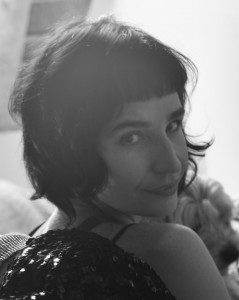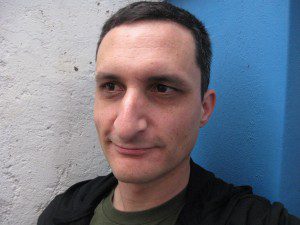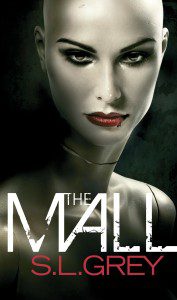Not only is S.L. Grey’s The Mall a nail-biting exploration of lives gone astray and a fast-paced, very frightening page-turner, it’s a savage critique of consumer culture that examines themes of identity, belonging and the grotesque automation of human beings by an evil corporate entity.
The Mall is the exhilarating and deliciously twisted collaboration from South African speculative fiction authors Sarah Lotz and Louis Greenberg.Together they are known as S.L. Grey [Note: some answers are labelled separately to distinguish between Sarah and Louis].
Grey talks collaborations, the South African genre-lit scene, putting each other in dangerous situations during the writing process, inspiring panic attacks in suburban malls and the challenge of wriggling out of dangerous situations.
When did you have the initial idea for The Mall and how did the collaboration work?
SL: When I was visiting Louis in Johannesburg, he took me to a weird subterranean mall to buy some shoes and (embarrassingly) while we were there, I had a panic attack. Louis immediately jumped on my pathetic behaviour and suggested that we ditch our initial zombie/vampire mash-up novel plans and set the book in a mall. We wrote via email, each of us focusing on a separate character and with a very quick chapter turnaround to keep the momentum going.
The novel speeds along at a clipped pace. Was sustaining that momentum challenging with the story shifting perspectives between Rhoda and Daniel, and did you prepare a narrative arc?
SLG: The writing process began from the purest of motives, which was to see if we could actually write a horror novel together – just for the fun of it. From the outset, there was very little planning and we enjoyed screwing with each other’s storylines – leaving the other writer’s character in a tricky situation that took ingenuity to wriggle out of. It did mean a hell of a lot of rewriting though, with both of us losing sections that didn’t work in the novel as a whole.
 Which one of you conjured the parallel Mirror-Mall Hell our protagonists find themselves in?
Which one of you conjured the parallel Mirror-Mall Hell our protagonists find themselves in?
SLG: We came up with the mirror mall together as far as we can remember. It grew gradually from imagining an entity feeding off the panic-attack-inducing atmosphere that lurks in every mall. In Johannesburg – the mall capital of Africa – we snuck through the mall’s stripped-back, gloomy corridors (the part that shoppers never see) which also sparked off ideas for mannequin graveyards and passageways that lead nowhere (or, even worse, somewhere).
The Mall examines themes of body image, identity and belonging, and the grotesque automation of humans by the evil corporate entity The Management. Could you tell me about any research you conducted for the novel and were your findings scary?
SL: Louis has worked for years in a mall bookstore and I have spent years wasting cash in shopping centres, so really that was all the research we needed.
LG: I drank lots of coffee and observed hipsters in the wild. Sarah didn’t need to go out of her way to research hipsters because she lives in Cape Town, where they are less skittish than in Johannesburg.
Could you tell me a bit about The Ward, what tantalising teasers can you provide?
SLG: For the time being, the blurb in the Corvus catalogue is as much as you’re going to get. We don’t want to spoil anyone’s fun.
What is the South African genre fiction scene like? Is there a large community and how important is it for writers to have that support network?
SLG: The community is fairly small but makes up for that by being extremely supportive – everyone is generous with their time, blurbs and retweets. The genre authors we know personally are all approachable and almost pathologically self-effacing. Lauren Beukes uses her multiple platforms to tirelessly promote other writers in all fields, horror grand-dame Nerine Dorman organises the writing section of the annual Horrorfest festival and continually pushes other writers on blogs and in interviews, and Joe Vaz, the editor of Something Wicked magazine, is always featuring South African authors and showcasing new talent. Jungle Jim pulp fiction magazine and the BooksLive website are also great, supportive platforms for South African writers.
Can you name some current writers/filmmakers/artists who scare you and why?
SL: Off the top of my head, the obvious ones – David Cronenberg, David Lynch and Kim Ji-Woon – all of whom have an intelligent, original and (sometimes) deliciously warped approach to horror (I’m not a fan of generic slash flicks or Tom Six-style gore-porn). I’ll watch anything directed by Andrea Arnold or Lynne Ramsay, not strictly horror of course (in a speculative sense) but gut-wrenching, disturbing and thought-provoking work.
As well as dabbling on the Indie side of things, I read a lot of mainstream horror (for example I’ll read anything by big name authors such as Peter Straub, Dan Simmons, China Mieville, Neil Gaiman, Stephen King, Joe Hill, David Moody and Sarah Pinborough), but the last time I was really scared was after I’d finished Adam Nevill’s story Florrie in Jonathan Oliver’s awesome House of Fear anthology – it gave me nightmares. Slightly off topic, I’ve just started Jesse Bullington’s Enterprise of Death which is excellent so far, and I’m working my way through the Kitchies Award list (Lavie Tidhar’s Osama is insanely good).
And while not truly horrific, I find photographer and artist Charlie White’s work genuinely disturbing (check out Understanding Joshua or Monsters).
LG: I’m in quite a different space from Sarah, whose daughter is grown up and who obviously has lots more time than I to watch movies and read. So the things that currently scare me are Barney and the terrifying denouements of Pixar movies, viewed through the eyes of a two and five-year-old. Watching films and advertisements and reading fairytales with young kids and anticipating their nightmares is an ideal exercise in making the mundane images and plots we take for granted terrifying again.
Have any producers expressed interest in optioning The Mall?
SLG: The Mall was selected as one of the Books at Berlinale in 2011, which was a real honour but it has not yet been optioned. Clearly David Cronenberg has too much on his plate right now.
 What separate projects do you both have in the pipeline?
What separate projects do you both have in the pipeline?
SL: I write a crime series and entry-level YA zombie series with my daughter Savannah called Deadlands, the second of which will be out in South Africa soon. I’m also tinkering with a couple of solo projects, but if I talk about them too much they’ll never get finished.
LG: I spend most of my time editing other writers’ work, and it’s always satisfying to see them come out and get good reviews. I am also working on my second solo novel.
As this is Women in Horror Recognition Month, could you name some women working in the genre you both admire?
SLG: We were lucky enough to be part of the Pandemonium: Stories of the Apocalypse anthology, alongside amazing writers like Sophia McDougall, Lauren Beukes, Archie Black, Lou Morgan, Kim Lakin-Smith and Chrysanthy Balis.
In South Africa, female genre writers to watch include Nerine Dorman, Joan de la Haye, Cat Hellison, Adeline Radloff and S.A. Partridge, and top literary authors, Henrietta Rose-Innes and Diane Awerbuck occasionally dip their toes into the speculative with spectacular results.
SL: I also really admire Kaaron Warren and Mira Grant’s work and I’ve just read and loved Michelle Paver’s Dark Matter, a sparse, atmospheric ghost story set in the Arctic.
ALAN KELLY
—
If you enjoyed our interview with S.L. Grey and want to read more of her fiction, please consider clicking through to our Amazon Affiliate links and purchasing a new book today. If you do you’ll help keep the This Is Horror ship afloat with some very welcome remuneration.










